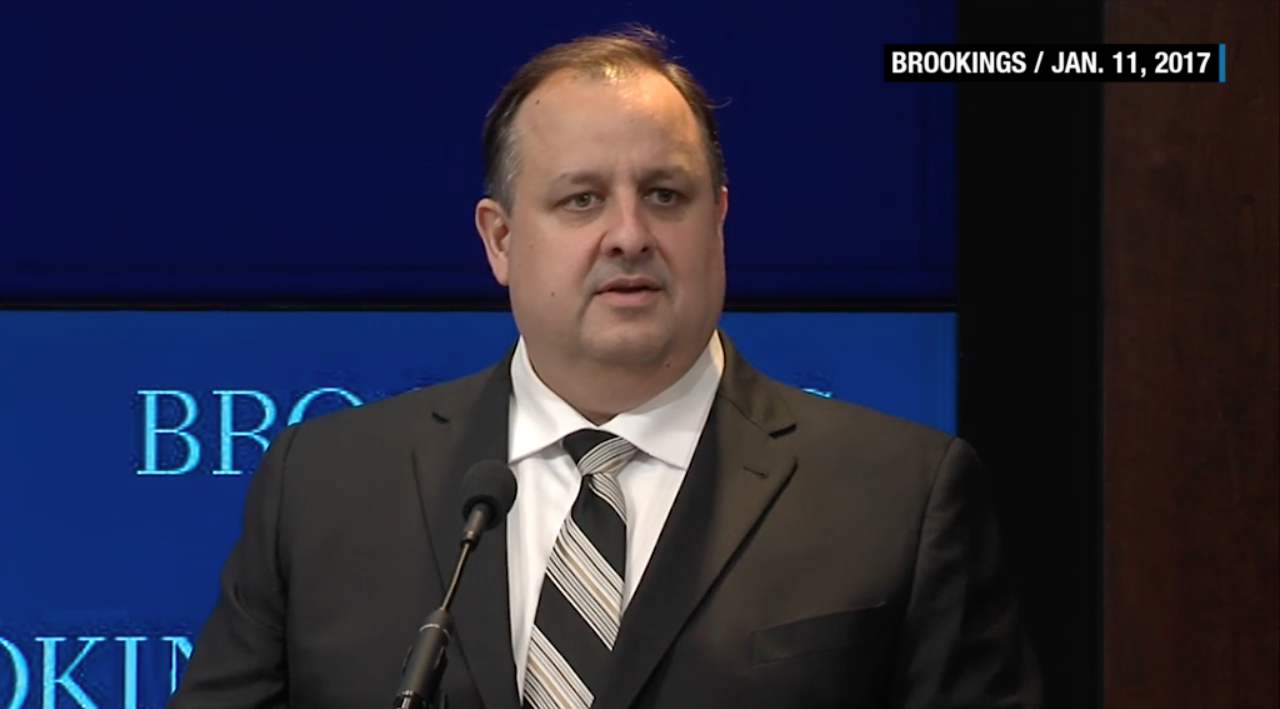
Office of Government Ethics head Walter Shaub speaks at the Brookings Institution in January. (Photo via CNN)
Walter Shaub, the director of the Office of Government Ethics, has thrown up his hands in the face of the Trump administration’s disregard for, well, government ethics. The veteran public servant sent a short resignation letter to Donald Trump today, half a year before his five-year term expired.
Shaub’s office was founded in the wake of Watergate, and oversees 4,500 employees who work on ethics-related issues across the government. But Shaub himself was little-known before Donald Trump became president. However, once it became clear that Trump intended to take his seat in the White House while doing next to nothing to resolve his conflicts of interest, Shaub, in consultation with Obama ethics lawyer Norm Eisen, hatched a plan to get Trump’s attention through Twitter and public speeches.
— Walter Shaub (@waltshaub) July 6, 2017
It’s unclear if it worked. Trump’s plan to distance himself from his businesses — which, Shaub said, was “meaningless,” “wholly inadequate” and doesn’t meet the standard “that every president of the past four decades has met” — has moved forward at a leisurely pace, and conflicts still abound. Shaub’s request that the White House discipline Kellyanne Conway for plugging Ivanka Trump’s clothing line on television went unheeded. More recently, Shaub wrestled with the White House to obtain copies of waivers allowing former lobbyists and former employees of corporations to work on policy that affects their former employers. The administration eventually released 16 waivers, “more than five times the number granted in the first four months of the Obama administration,” The New York Times reported.
But for his very public tussles with the administration, Shaub, the reluctant crusading bureaucrat, became a celebrated internet hero. And, in quitting, Shaub has become the latest in a stream of highly placed regulators to declare their work with the Trump administration a lost cause.
Just last month, for example, the Justice Department’s top lawyer for compliance resigned. Hui Chen, whose career includes public service as a federal prosecutor as well as stints as a lawyer for Pfizer and Microsoft, said she couldn’t ask companies to act ethically when the administration was so willing to flout the rules. “Trying to hold companies to standards that our current administration is not living up to was creating a cognitive dissonance that I could not overcome,” Chen wrote in a LinkedIn post last week. “To sit across the table from companies and question how committed they were to ethics and compliance felt not only hypocritical, but very much like shuffling the deck chair on the Titanic.”
Creating that sense among ethics watchdogs — that they’re aboard a sinking ship — may be exactly the administration’s aim, according to Ann Ravel, an Obama appointee to the Federal Elections Commission who quit in March after denouncing the commission’s dysfunction. “The effort to decimate this commission was done tactically and thoughtfully and now it’s something that will ultimately be utilized for many other agencies in the government,” she told BillMoyers.com on her last day in office. “The idea of public service, and following what the missions of the agencies are, is not something that seems to be of concern.”
The Trump administration will be able to fill these vacant posts with their own choice of regulator. Or, they could leave the empty chairs empty, an outcome that would no doubt be in line with Steve Bannon’s purported goal of “deconstruction of the administrative state.”
Shaub, meanwhile, apparently intends to continue his fight to bring the administration to heel from outside of the government. He will be joining the Campaign Legal Center as the group’s senior director for ethics. The nonprofit watchdog keeps a careful eye on the doings of politicians, and the super PACs and dark money groups that help them win election, and is quick with a lawsuit against anyone who tries to bend the rules. The group also tracks voting rights, and politicians’ efforts to disenfranchise voters through ID laws and gerrymandering. Its founder, Trevor Potter, served as John McCain’s lawyer and later set up a super PAC for Stephen Colbert. (He also has been a guest on Moyers & Company.)
“In working with the current administration, it has become clear to me that we need improvements to the existing ethics program,” Shaub said in a statement. “I look forward to working toward that aim at Campaign Legal Center, as well as working on ethics reforms at all levels of government.”




